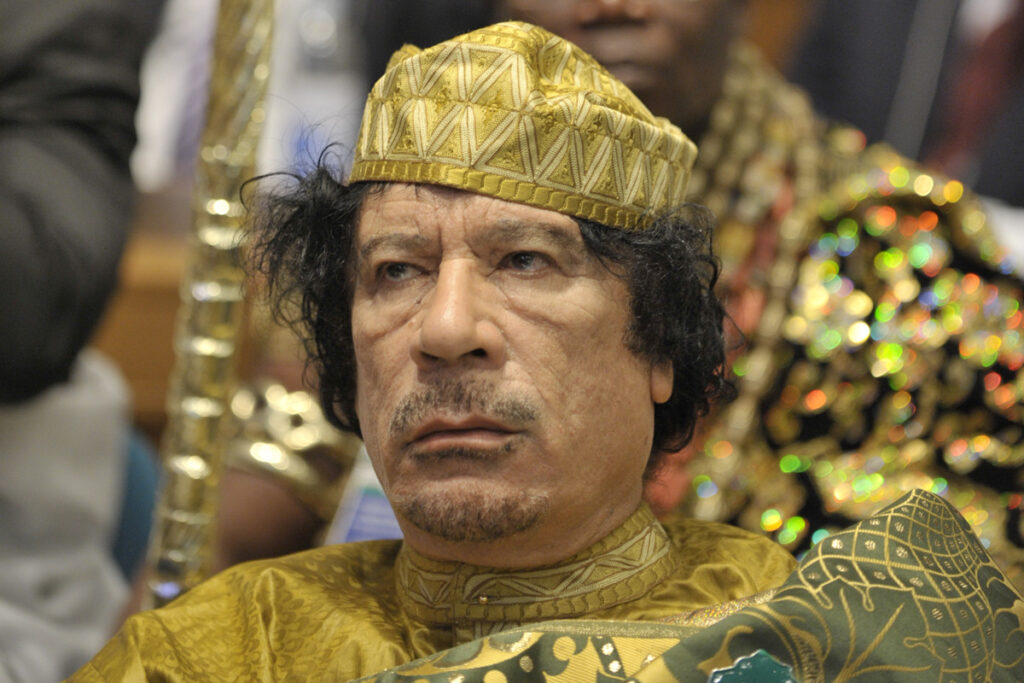“Reflecting on the Legacy of Muammar Gaddafi’s Deposition: A Glimpse into Libya’s Past and Present”
On October 20, 2011, the longstanding Libyan leader, Muammar Gaddafi, was ousted from power, marking a pivotal moment in the nation’s history. Fast forward six years, the narrative surrounding this North African country has been characterized by turbulence and disorder, despite international endeavors to restore stability.
Revisiting the events six years after his capture and demise in his hometown of Sirte, we delve into key highlights of Gaddafi’s rule, accompanied by an assortment of captivating visuals that encapsulate his leadership era.
Local insurgent factions joined forces with Western allies, most notably the North Atlantic Treaty Organization (NATO), to overthrow the autocrat who had governed Libya for nearly five decades.
Presently, Libya finds itself divided, governed by rival factions that hold sway over various sectors of the oil-rich land. The extremist group ISIS had even managed to establish a foothold in parts of Sirte until recently, only to be expunged through concerted governmental resistance.

In the words of a resident from 2016, “We find ourselves in a period more dire than the previous one, with the very existence of Libya hanging in the balance.”
“After the fall of the prior regime, we nurtured hopes that, with divine providence, our nation’s prospects would improve. We hold high expectations for our homeland,” emphasized another resident, advocating for national unity and reconciliation as the sole route to rebuilding the nation.
Key Insights into Gaddafi’s Legacy
Gaddafi met his demise in his hometown of Sirte, mirroring his birthplace on June 7, 1942.
He received education from the Libyan military academy, complemented by training experiences in Greece and the United Kingdom.
Seizing power through a coup d’état on September 1, 1969, Gaddafi promoted himself from ‘Captain’ to ‘Colonel’ post-coup.
He entered matrimony twice and fathered seven sons and a daughter.
His notable work, the ‘Green Book,’ published in 1975, expounded his Third Universal Theory.
Muammar Gaddafi’s Unforgettable Chapter – October 20, 2011
Gaddafi’s charismatic and controversial leadership left an indelible mark on the 20th century political landscape, generating ongoing discussions and debates.
His downfall unfolded when rebel forces captured him in Sirte, following a revolution backed by NATO intervention. Although it was widely speculated that his son, Saif Al-Islam Gaddafi, would succeed him, the elder Gaddafi’s demise altered the course of succession, prompting both local and international legal proceedings against Saif.
Ascending to power in 1969 through a bloodless coup, Gaddafi’s rule endured for 42 years before he met his end at 69 years old.
He took the reins from King Idris I, who was seeking medical attention in Turkey at the time.
Subsequent to his death, Libya remains devoid of a designated successor, witnessing political factionalism after Gaddafi’s demise in 2011 at the hands of rebel forces.
Gaddafi in quotes
“There is no state with a democracy except Libya on the whole planet. In the Middle East, the opposition is quite different than the opposition in advanced countries. In our countries, the opposition takes the form of explosions, assassinations, killings.”
Address to US Academics, March 2006
“Libya is an African country. May Allah help the Arabs and keep them away from us. We don’t want anything to do with them.“
Libyan TV, March 2007
“I am an international leader, the dean of the Arab rulers, the king of kings of Africa and the imam of Muslims, and my international status does not allow me to descend to a lower level.“
Arab League summit, March 2009
“Freedom of expression is the right of every natural person, even if a person chooses to behave irrationally, to express his or her insanity.”
“Women, like men, are human beings. This is an incontestable truth… Women are different from men in form because they are females, just as all females in the kingdom of plants and animals differ from the male of their species… According to gynaecologists women, unlike men, menstruate each month… Since men cannot be impregnated they do not experience the ailments that women do.”


